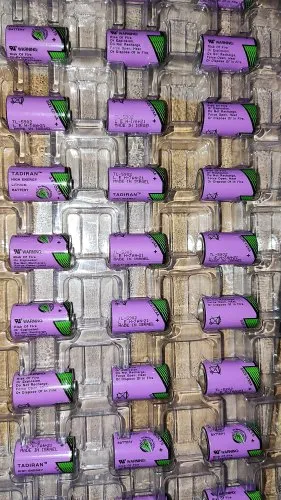Tadiran TL5902 1/2AA Lithium Battery
₹100.0
| Model Number | 1/2 AA |
| Battery Capacity | 1500mAH |
| Voltage | 3.6 V |
| Brand | Tadiran |
| Battery Type | Lithium Manganese Dioxide |
| Usage/Application | Electric Vehicle |
- Description
- Additional information
- Reviews (0)
- Q & A
- Sustainability Remark
- More Offers
- Store Policies
- Inquiries
We are one of the eminent supplier of Tadiran TL-5902 1/2AA Lithium Battery to our customers. Please do share your requirement for best competative price.
| brands | TADIRAN |
|---|
You must be logged in to post a review.
Q & A
Electrochemical batteries, such as lithium-ion batteries, have gained significant attention in recent years due to their widespread use in portable electronics, electric vehicles, and renewable energy storage systems. While they offer several advantages, including high energy density and efficiency, their overall sustainability depends on various factors.
Resource Extraction: The production of electrochemical batteries requires the extraction of raw materials such as lithium, cobalt, and nickel. The mining and processing of these materials can have environmental and social impacts, including habitat destruction, water pollution, and human rights concerns. Efforts are being made to improve responsible sourcing and reduce the environmental footprint of mining operations.
Manufacturing Process: Battery manufacturing involves energy-intensive processes that emit greenhouse gases and consume significant amounts of water. However, efforts are underway to optimize manufacturing techniques, reduce energy consumption, and adopt cleaner production methods to mitigate these impacts.
Energy Efficiency: Electrochemical batteries have high energy efficiency, meaning they can store and release electricity with minimal losses. This efficiency helps reduce overall energy consumption and greenhouse gas emissions by enabling the integration of renewable energy sources and improving the efficiency of electric vehicles.
Battery Lifespan and Recycling: The lifespan of electrochemical batteries varies depending on the type and application but is typically limited. Extending the lifespan of batteries through improved design and management strategies can enhance their sustainability. Additionally, battery recycling programs are being developed to recover valuable materials and reduce the environmental impact of battery disposal.
Environmental Impact: Improper disposal or recycling of batteries can lead to environmental pollution, particularly if toxic substances leach into soil and water. Adequate recycling infrastructure and proper disposal methods are crucial for minimizing these impacts and recovering valuable materials.
Technological Advancements: Ongoing research and development efforts aim to improve battery technologies, including the exploration of alternative materials, such as solid-state electrolytes, to enhance performance, safety, and sustainability. These advancements can lead to batteries with reduced environmental impact and improved sustainability.
While electrochemical batteries contribute to a more sustainable energy system by enabling the integration of renewable energy and reducing greenhouse gas emissions from transportation, their overall sustainability is still a subject of ongoing research and development. Continued efforts in responsible sourcing, manufacturing efficiency, recycling infrastructure, and technological advancements will contribute to enhancing the sustainability of electrochemical batteries.
General Inquiries
There are no inquiries yet.



















Reviews
There are no reviews yet.